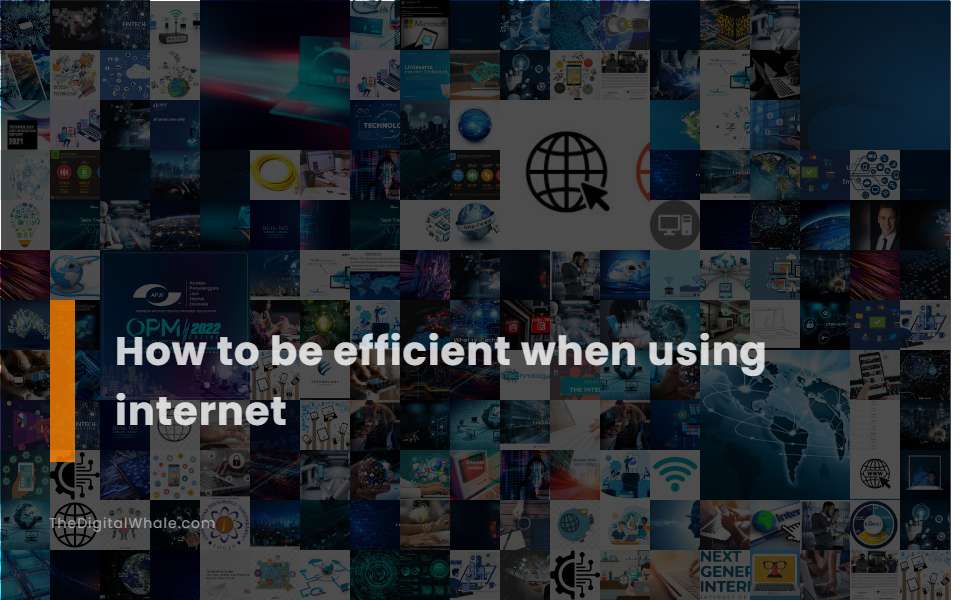How To Be Efficient When Using Internet
What is the best way to find information about a specific topic on the Internet? How can you become more efficient by using the internet? Let's find out more about How To Be Efficient When Using Internet.

Update your router's firmware
Updating your router's firmware is crucial for enhancing security, stability, and performance. It involves downloading the latest version from the manufacturer's website, connecting your computer directly to the router, and following the manufacturer's instructions to avoid interruptions and potential damage to the device. For a comprehensive guide on this process, you can check out the How to Update Router Firmware guide for step-by-step instructions and tips to ensure a smooth update.
Optimize your router settings
To optimize your router settings effectively, it's crucial to place the router in a central, elevated location, away from obstructions, and adjust the antennas to ensure better signal dispersion. Selecting the correct channel width and the least congested channel can significantly enhance performance. Additionally, configuring Quality of Service (QoS) settings is essential to prioritize bandwidth-sensitive applications. Furthermore, enabling support for the latest WiFi technologies and utilizing the 5 GHz frequency band can help reduce interference. Adjusting settings like WMM, beacon interval, and DTIM interval is also beneficial. To learn more about best practices for router optimization and security, explore this comprehensive guide from Downtown Computers. Enabling features such as beamforming and IGMP snooping can further improve performance and cater to specific use cases.
Choose a new Wi-Fi channel
To choose an efficient Wi-Fi channel, use a WiFi analyzer like NetSpot to identify the least crowded non-overlapping channels and select the one with the highest Signal-to-Noise Ratio (SNR) to minimize interference and optimize your connection.
Use a 5 GHz Wi-Fi channel
Using a 5 GHz Wi-Fi channel can improve internet efficiency by providing faster data transfer rates, reducing interference with more non-overlapping channels, and optimizing performance for bandwidth-intensive activities like streaming and online gaming. The benefits offered by 5 GHz Wi-Fi are highlighted extensively on the Reolink Blog. However, this technology does come with a shorter range and poorer penetration through solid objects, making it essential to consider layout and range extenders for optimal coverage.
Reset your router regularly
Resetting your router regularly, ideally once a month or more frequently when there are multiple users or older equipment, can significantly enhance your network's performance. This routine helps in clearing memory, resolving connectivity issues, and optimizing WiFi channels, while also enhancing security by updating firmware and severing potential hacker connections. According to Reader's Digest, rebooting your router not only maintains optimal performance but also updates security software, which is crucial for protecting against hackers and malware. Therefore, to ensure your network functions at its best, incorporating a regular reboot schedule for your router is highly recommended.
Related:
What are some tips to stay safe online? What is the best way to protect your online account? Let's find out more about How To Stay Safe When Using Internet.
Use a wired Ethernet connection
Using a wired Ethernet connection is more efficient due to its faster speeds, lower latency, and more reliable performance, making it ideal for activities like online gaming, video conferencing, and transferring large files. For more in-depth information on this comparison, visit the article on Superior Performance: A Wired Internet Connection vs. A Wi-Fi Connection, where the pros and cons of each option are thoroughly explored. Whether you are a dedicated gamer or someone who frequently engages in professional virtual meetings, understanding the distinct advantages of each type of connection can significantly impact your digital experience.
Manage device connections and limit unused devices
Efficiently managing device connections is crucial for maintaining optimal internet performance. One way to achieve this is by turning off unused devices to free up bandwidth. If you're experiencing network congestion, consider upgrading your router or using WiFi extenders to distribute the load and enhance internet speed and security. Limiting the number of connected devices, particularly those that consume high bandwidth such as cameras and 4K TVs, can significantly reduce congestion. Furthermore, updating or replacing older devices and routers is essential for sustaining optimal network performance. For more insights on how devices can affect your internet speed, you can visit the website Whidbeytel.
Clear browser cache, cookies, and history
To clear browser cache, cookies, and history efficiently, use the keyboard shortcut Ctrl+Shift+Delete in most browsers, or navigate to the browser's settings to select the appropriate options. It is important to ensure that you close and restart the browser after clearing the data. For more detailed guidance, you can visit the Kaspersky Resource Center for comprehensive instructions on maintaining browser performance and privacy.
Monitor and prioritize bandwidth usage
To effectively monitor and prioritize bandwidth usage, it is crucial to reserve bandwidth for business-critical applications while regulating non-essential traffic. Techniques such as bandwidth throttling, congestion control, and packet dropping are employed to ensure that high-priority traffic is forwarded immediately. Additionally, determining the bandwidth requirements of each application, multiplying by the number of users, and utilizing tools to identify performance issues can help optimize bandwidth use. For more insights on this topic, you can explore strategies like port aggregation and load balancing on TechTarget, allowing you to fine-tune bandwidth usage efficiently.
Disable non-essential background programs and check for malware
To be efficient when using the internet, disable non-essential background programs using methods such as Task Manager, System Settings, or tools like MiniTool System Booster to free up system resources. Additionally, regularly check for and remove malware using antimalware software to prevent unauthorized resource usage and maintain system performance.
Related:
What are the dangers of the digital age? What are some of the dangers of a digital life? Let's find out more about What Are the Dangers of Digital Life?.
